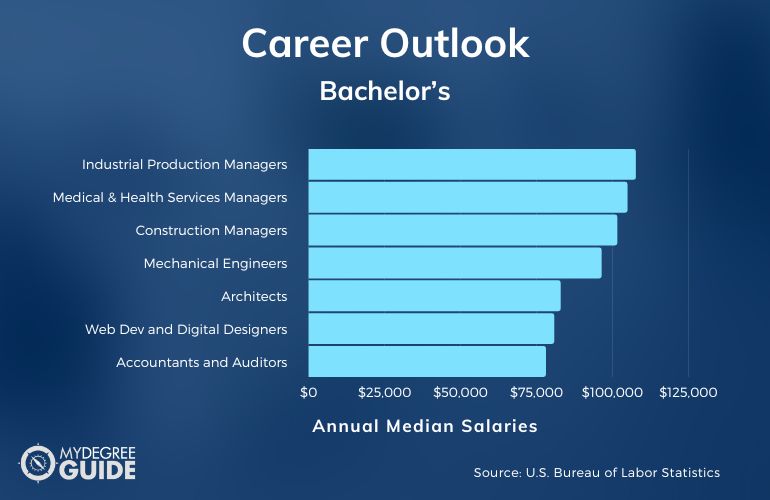What can you do with a bachelors degree? Many ask this question as they consider whether college is right for them.

While not all careers require advanced education, there are many jobs that require a bachelor’s degree. There are even jobs that will pay more and provide greater advancement opportunities to those who have a bachelor’s.
Editorial Listing ShortCode:
Let’s take a look at some of the jobs that require a bachelor’s degree as well as some of the majors that make the most money.
What Can You Do with a Bachelors Degree?

Earning your bachelors degree can help you fine-tune your skills in your preferred field.
Receiving a degree can also demonstrate to future employers that you are familiar with the research and analytical skills that are helpful in that field. While not all careers require a bachelors, those who are interested in pursuing management roles in the future may benefit from having a degree.
Editorial Listing ShortCode:
The Bureau of Labor Statistics notes that professionals who have earned a bachelor’s degree typically earn nearly twice as much as those who have a high school education. Additionally, they experience unemployment at nearly half the rate of high school graduates. Regardless of your desired field, it is very likely that a relevant bachelor’s degree program is available to grow your knowledge and qualifications.
Whether you’re interested in leadership and organizing a business, communicating with teams, or understanding common practices and the theories behind them, it’s likely you’ll find a bachelors program to help you build upon those skills.
5 Things You Can Do with a Bachelor’s Degree
There are many career paths in which having a bachelor’s degree can be helpful. Let’s take a look at just a few examples of jobs that require a bachelor’s degree.
1. Accountant

Accountants manage income and expenses. This includes keeping financial records, understanding investments, and calculating risk.
Some work in the accounting department of a business, while others work for individuals. Those who major in accounting will learn about types of record keeping, math, legal and tax implications, and financial reporting.
2. Marketing Manager

A marketing manager works in developing, designing, and spreading the word about a brand or business. They are involved in organizing marketing projects and public relations while leading a team of contributors.
Many marketing managers receive their bachelor’s degree in marketing, communications, business administration, or public relations.
3. Web Developer

Web developers frequently have a degree in computer science or information technology. They study programming languages and how to create and maintain secure, high-performance websites.
In the professional world, web developers work to create websites and applications for businesses of all sizes, non-profit organizations, and individual clients.
4. Architect

Architects receive information from clients and design buildings based on their requests, which may include homes, businesses, large buildings, and restaurants.
Architects frequently earn a bachelor’s degree in architecture or engineering. In their program, they’ll study physics, engineering basics, design elements, and legal structural requirements.
5. Teacher

Teachers help form the minds of those interested in learning. From early childhood education to high school academics, most teachers are required to have a bachelor’s degree as part of their state licensing process.
Editorial Listing ShortCode:
Education majors will study organizational theories, educational tools and processes, psychology, and classroom procedures.
Bachelor’s Degree Careers & Salaries

So, what can you do with a bachelor’s degree? Well, there are many possibilities in nearly every field. According to the Bureau of Labor Statistics, many entry-level roles require a bachelors degree, but many managerial roles only require a bachelor’s as well.
| Careers | Annual Median Salaries |
| Industrial Production Managers | $107,560 |
| Medical and Health Services Managers | $104,830 |
| Construction Managers | $101,480 |
| Mechanical Engineers | $96,310 |
| Architects | $82,840 |
| Web Developers and Digital Designers | $80,730 |
| Accountants and Auditors | $78,000 |
| Market Research Analysts | $68,230 |
| Human Resources Specialists | $64,240 |
| Kindergarten and Elementary School Teachers | $61,620 |
Earning your bachelor’s degree can help you qualify for more job opportunities, and a bachelors can also be step toward additional education and training.
Benefits of a Bachelor’s Degree

Bachelors degree jobs often hold a lot of responsibility, but many professionals claim there are additional benefits to having earned a degree, including:
- Greater marketability. Many professionals cite greater marketability within their field thanks to their specialized training they received within their degree program.
- More job opportunities. More and more jobs are requiring advanced education.
- Greater job satisfaction. College graduates often enjoy work environments in which their professional opinion is respected.
- Wider network of associates. This network could include trusted professors, mentors, advisors, and fellow students.
- Higher earning potential. With a degree, some also see more rapid career advancement in jobs related to their major.
Studying for your bachelor’s degree is a commitment, but there can be many personal and professional benefits from pursuing higher education.
Is Financial Aid Available?

For those who want to earn a bachelor’s degree, there are many financial assistance options available to students who qualify.
You could start by completing the Free Application for Federal Student Aid (FAFSA). This form can help determine your eligibility for need-based aid, such as federal student loans and work-study programs. You may also wish to check out scholarship and grant opportunities. These may be offered by your school, private donors, communities, and businesses.
Additionally, you can see if your employer has a tuition reimbursement or educational assistance program for workers who are pursuing a college degree.
What Is a Bachelor’s Degree?

A bachelor’s degree is earned from an undergraduate college or university, and it can be an important step in pursuing a preferred career.
Do you need an associate’s degree to get a bachelor’s degree? Although there are benefits to obtaining your associate’s degree prior to starting your bachelor’s degree, no, it is not necessary.
Students who earn a bachelors degree typically study for 4 years with full-time enrollment. They choose a specific area of study, known as a major. Some choose concentrations within their major that allow them to focus on a particular skill within a field of study. Earning a bachelor’s degree may provide you with the resources and instruction required to succeed within a particular career.
Editorial Listing ShortCode:
You can learn about theories, procedures, specialized knowledge, ethical concerns, legal requirements, strategy, and more in your field of choice.
What Are the Highest Paying Bachelor Degree Jobs?

The following are some of the highest paying jobs that require a minimum of a bachelors degree. Median salary data from the Bureau of Labor Statistics is listed as well:
- Computer and information systems managers — $164,070
- Airline and commercial pilots — $148,900
- Marketing managers — $140,040
- Sales managers — $130,600
- Human resources managers — $130,000
Thinking of your preferred career path may help you select the college major that’s the right fit for your future goals.
Can You Get a Second Bachelor’s Degree?

You can get a second bachelor’s degree. In fact, earning a second bachelor’s degree may improve your marketability within your field. You might also consider earning a second bachelor’s degree as your professional field changes and expands.
With more educational opportunities and majors offered than before, some professionals use this as a chance to expand their educational and professional horizons. Others decide to get a second bachelor’s degree in order to change career paths completely.
What’s the Difference Between a Bachelor of Arts vs. Science Degree?
A Bachelor of Arts degree and a Bachelor of Science degree hold the same weight, as they are both undergraduate degrees received from a college or university. There are a few differences, though, between the two.
| Bachelor of Arts (BA) | Bachelor of Science (BS) |
|
|
The type of bachelor’s degree you receive will depend on the major you choose.
Is a Bachelor’s Degree Worth It?

Yes, a bachelor’s degree is worth it for many students. Earning your degree can help provide you with the opportunity to qualify for many different jobs.
Studying for a bachelor’s is a commitment, but many feel the rewards are worth the effort. As an undergraduate student, you’ll have access to top notch faculty, resources, and programs to help you succeed in your chosen field.
Editorial Listing ShortCode:
The Bureau of Labor Statistics notes that there are a greater number of jobs available for those who have earned on campus or online bachelor’s degrees, and earnings from those jobs are often greater as well.
Getting Your Bachelors Degree Online

As you research how to get a bachelor’s degree, you may wonder if getting your degree is worth the investment of time and money.
Many professionals feel that the bachelor’s degree they received from an accredited college or university has provided them with greater opportunities, knowledge, and confidence in their fields. Whether you’re looking for a major that makes the most money or a new career path for personal satisfaction, earning a bachelors could be the next step toward reaching your goals.
You can begin exploring quick online degree programs from accredited schools today to get started on your educational journey.

